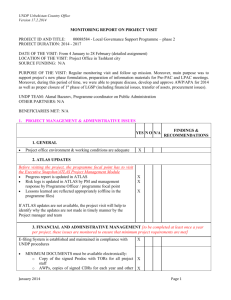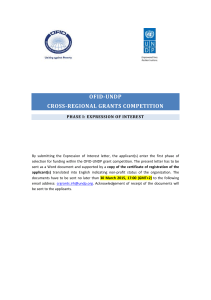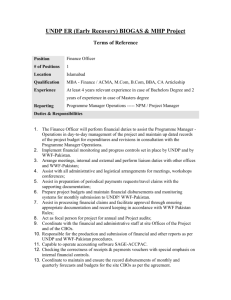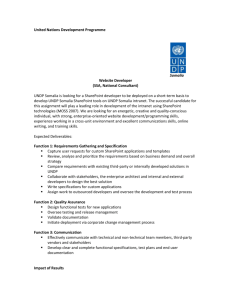Word - UNDP
advertisement
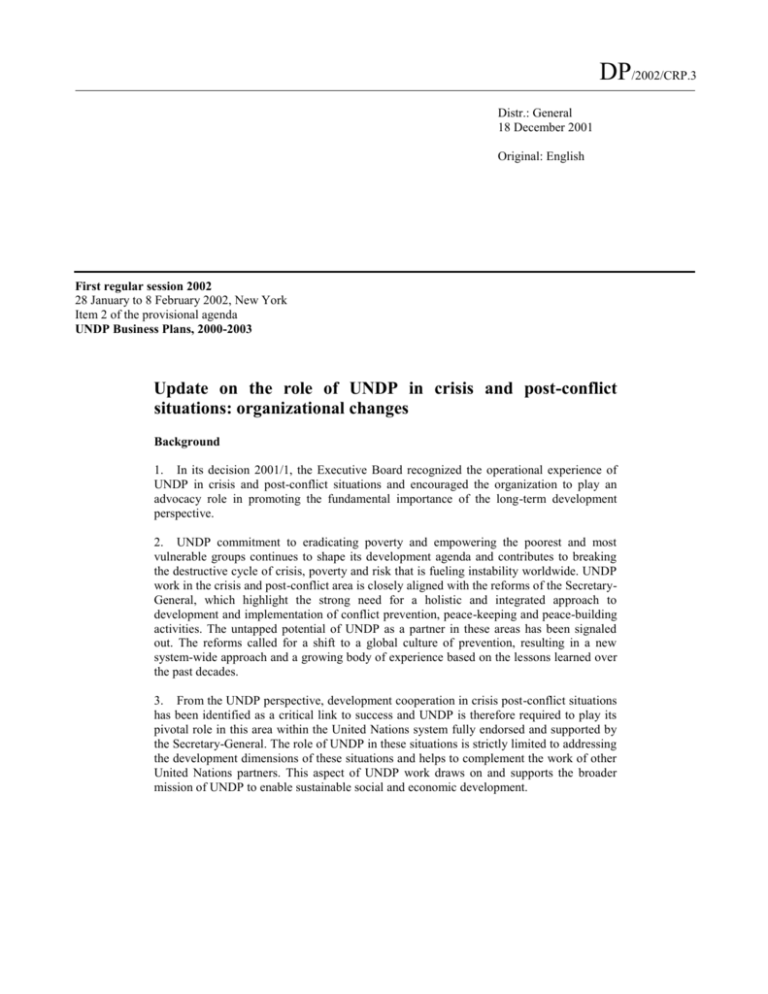
DP/2002/CRP.3 Distr.: General 18 December 2001 Original: English First regular session 2002 28 January to 8 February 2002, New York Item 2 of the provisional agenda UNDP Business Plans, 2000-2003 Update on the role of UNDP in crisis and post-conflict situations: organizational changes Background 1. In its decision 2001/1, the Executive Board recognized the operational experience of UNDP in crisis and post-conflict situations and encouraged the organization to play an advocacy role in promoting the fundamental importance of the long-term development perspective. 2. UNDP commitment to eradicating poverty and empowering the poorest and most vulnerable groups continues to shape its development agenda and contributes to breaking the destructive cycle of crisis, poverty and risk that is fueling instability worldwide. UNDP work in the crisis and post-conflict area is closely aligned with the reforms of the SecretaryGeneral, which highlight the strong need for a holistic and integrated approach to development and implementation of conflict prevention, peace-keeping and peace-building activities. The untapped potential of UNDP as a partner in these areas has been signaled out. The reforms called for a shift to a global culture of prevention, resulting in a new system-wide approach and a growing body of experience based on the lessons learned over the past decades. 3. From the UNDP perspective, development cooperation in crisis post-conflict situations has been identified as a critical link to success and UNDP is therefore required to play its pivotal role in this area within the United Nations system fully endorsed and supported by the Secretary-General. The role of UNDP in these situations is strictly limited to addressing the development dimensions of these situations and helps to complement the work of other United Nations partners. This aspect of UNDP work draws on and supports the broader mission of UNDP to enable sustainable social and economic development. DP/2002/CRP.3 The changing environment 4. Against this background, there has been a rapidly increasing demand for UNDP development services and coordination support in the area of crisis and post-conflict situations from various programme countries, the United Nations system and other partners. Further accentuated by recent global events, this has led to greater recognition by all these partners of the need for the Unite Nations to lead crisis-prevention and recovery activities. While UNDP has been active in this area for several decades, the environment in which the organization is now operating has changed dramatically and continues to do so, as seen by recent events. 5. UNDP partners see the many unique attributes of the organization that are crucial in United Nations-led crisis-prevention and recovery activities; for example, its extensive country office network, including offices in all crisis countries; its operational flexibility, notably in countries emerging from crisis; its track record and expertise in disasterprevention and disaster-recovery expertise; its experience in formulating transition and recovery strategies; and its expertise in capacity-building. All of these enable UNDP to play a key-contributing role in closing the gap between humanitarian work and long-term development. In his annual report for 2000 (DP/2001/14), the Administrator confirmed that by focusing very closely on its development mandate, UNDP has been meeting the challenge in this area during 1999 and 2000. 6. In carrying out its activities in crisis prevention and recovery, UNDP complements and seeks stronger partnerships within and beyond the United Nations system, not least with the Department for Political Affairs, the Department of Peace-keeping Operations, the Office for the Coordination of Humanitarian Affairs and Bretton Woods institutions. This aspect of the organization’s work draws upon and supports the broader mission of UNDP to enable sustainable social and economic development. Furthermore, other than the 5 per cent core (regular) programme resources designated by the Executive Board for this area, UNDP depends principally on extrabudgetary (other) resources to fund its overall activities. Therefore, despite growing demand for UNDP development services and coordination support, there is no diversion of core resources from regular development activities to this area. Organizational implications and changes 7. As mentioned by the Administrator in the budget estimates for the biennium 20022003 (DP/2001/21), the operational responsibility within UNDP for this area was entrusted to the Emergency Response Division. This Division has minimal funding from the regular budget for 3 international professional posts and 3 support staff posts at the headquarters level, supported by 15 temporary emergency posts at the field level. The remaining UNDP capacity comes from extrabudgetary resources, projected in the context of the 2002-2003 budget to cover 49 temporary professional positions and 19 temporary support staff positions and related operating costs. 8. The Administrator believes, and experience has shown, that the current stature and profile of the Emergency Response Division as well as its leadership needs to be adjusted to meet adequately the ever-increasing demands on UNDP in this area. The current environment calls for high-level interactions within the United Nations system and Bretton Woods institutions, as well as with senior government officials both in programme countries and key bilateral donor countries. 2 DP/2002/CRP.3 9. Following consultations with the Secretary-General, the Administrator communicated to the Advisory Committee on Administrative and Budgetary Questions (ACABQ) his plans to elevate the Emergency Response Division to the level of a Bureau and to establish stronger leadership by creating a Director of the Bureau at the post level equivalent to that of other UNDP bureaux, i.e., at the Assistant Secretary-General level (see annex I to the present document). He informed the Committee that the Assistant Secretary-General post is to be funded from extrabudgetary resources for a period of two years, with any further extension subject to review by both ACABQ and the Executive Board in the context of the next biennial support budget submission. The incumbent of the post would be one that brings a high profile to the position, enabling UNDP to respond to the increasing demands in the area at hand, including resource mobilization. 10. The Administrator appreciates the fruitful discussions between his representatives and ACABQ on this important subject. The response of the Committee on his plans is provided in annex II to the present document. While the Committee expressed its reservations on the plans put forward by the Administrator, it recognized in his letter to him “that to fill the gap between relief and long-term reconstruction, there may be a need to obtain appropriate expert advice under your own prerogative that would allow you to address fully issues of prevention, post-conflict and natural disaster mitigation in order to promote and support sustainable development of country programmes”. 11. The comments and support of ACABQ are highly valued, as the organization moves ahead in getting UNDP properly equipped to respond to the ever-increasing demands in the area of crisis prevention and recovery, a crucial role in which the United Nations system collectively cannot afford to fail. Against this background, the Administrator has therefore under his own prerogative elevated the Emergency Response Division to the level of a Bureau named Bureau for Crisis Prevention and Recovery (BCPR), under the leadership of a Director at the Assistant Secretary-General level, funded from extrabudgetary resources. This arrangement will be for a period of two years effective 1 November 2001. 12. On the basis of the experience gained from this arrangement, the Administrator will decide whether the post of Director, BCPR, should continue at the Assistant SecretaryGeneral level; if so, he will include it in the context of his budget estimates for the 20042005 biennium. This would be fully in line with the request made by ACABQ that a review of the structure of UNDP bureaux and other organizational units be presented in the context of the next support budget estimates, taking into account the commitment of UNDP to rationalize its posts continually in accordance with relevant regulations and rules. 3 DP/2002/CRP.3 Annex I Letter dated 10 October 2001 from the Administrator of the United Nations Development Programme to the Chairman of the Advisory Committee on Administrative and Budgetary Questions Subject: Establishment of an Assistant-Secretary-General post for crisis prevention and recovery funded from extrabudgetary resources I wish to share with you my plan to establish an Assistant-Secretary-General post funded from extrabudgetary resources for a period of two years commencing 1 November 2001 and to present to you the context in which this action is taken. As you will recall in the context of the ACABQ session in June 2001on the 2002-2003 budget, the subject of UNDP activities in crisis and post-conflict situations was discussed. As mentioned, the role of UNDP in this area is strictly limited to addressing the development dimensions of these situations, and helps to complement the work of other United Nations partners. This aspect of UNDP work draws upon and supports the broader mission of UNDP to enable sustainable social and economic development. In performing its critical mission in the area of poverty reduction and associated areas, UNDP development work is at the forefront of efforts to break the pernicious cycle of crisis, poverty and risk that is among the causes of instability worldwide. Closely linked to the role of UNDP in this area were the reforms of the SecretaryGeneral. These reforms highlighted the strong need for a holistic and integrated approach to the development and implementation of conflict prevention, peace-keeping and peacebuilding activities, singling out the “untapped potential” of UNDP as a partner in these areas. The reforms called for a global “culture of prevention”, which has resulted in a new system-wide approach and a growing body of experience on the shortcomings of today’s handling of countries in transition. These forces for change have called for UNDP to play a pivotal role in the area of conflict prevention through the reduction of risk and vulnerability, which is at the heart of development mandates, recovery and peace-building in countries after conflicts have occurred. In this context UNDP in January 2001 outlined to its Executive Board in document DP/2001/4 1, its work in the areas of crisis prevention, recovery and transition to sustainable development. UNDP has unique attributes to bring to bear: its extensive country office network, including in all crisis countries; its operational flexibility; its track record and expertise in specific fields such as governance and rule of law, notably in countries emerging from crisis; its disaster prevention and recovery expertise; and experience in formulating transition and recovery strategies. All of these allow UNDP to help to close the gap between humanitarian work and long- term development. UNDP is therefore not seeking to carve out new interventions or new mandates, but merely to mainstream its work in this area into its business practices, while seeking stronger partnerships within and beyond the United Nations system, not least with OCHA, DPA, DPKO and the World Bank. Furthermore, other than the core programme resources designated by the Executive Board for this area, UNDP depends on other resources to fund its overall activities. 1 4 Presented to the Committee in the context of the 2002-2003 budget session DP/2002/CRP.3 As mentioned at the ACABQ session, I entrusted the operational responsibility within UNDP for this area to the Emergency Response Division (ERD). ERD has a minimal core funding of three international professional posts and three support staff posts from the regular budget, with its remaining capacity coming from other resources (extra-budgetary). The overall staffing table of ERD was presented to the ACABQ in the context of the 20022003 budget. Since the role of UNDP role in the crisis and post-conflict area was endorsed by the UNDP Executive Board and even since the presentation of the 2002-2003 budget, there has been increasing demand for UNDP services from programme countries, the United Nations system and other partners. All these partners have highlighted how recent global events are leading to greater recognition of the need for United Nations-led crisis prevention and recovery activities. I believe that a key factor in the ability of UNDP to respond to these new demands will be the stature and profile of ERD and its leadership. I therefore wish to elevate ERD to the level of a Bureau named: Bureau for Crisis Prevention and Recovery and establish stronger leadership by creating a Director of the Bureau at the post level equivalent to that of other UNDP Bureaux. The current environment calls for high-level interactions within the United Nations system, Bretton Woods institutions, as well as with senior government officials both in programme countries and key bilateral donors. Against this background, I wish to establish an Assistant-Secretary-General post funded from other resources (extrabudgetary) for a period of two years commencing 1 November 2001. The terms of reference of the proposed position are attached. The selected candidate will be one that brings a high profile to the position, enabling UNDP to respond to the increasing demands in the area at hand, including resource mobilization. I fully understand the Committee’s concerns on high-level posts, and wish to assure the Committee that UNDP is committed to continually rationalizing the need for these posts. I value your advice on this subject. If the Committee has any queries or clarification on this proposal, please do not hesitate to contact me. I thank the Committee for their attention to this matter. (Signed) Mark Malloch Brown Administrator United Nations Development Programme 5 DP/2002/CRP.3 Annex II Letter of 31 October 2001 from the Chairman of the Advisory Committee on Administrative and Budgetary Questions to the Administrator of the United Nations Development Programme Subject: Establishment of an Assistant-Secretary-General post for crisis prevention and recovery funded from extrabudgetary resources The Advisory Committee on Administrative and Budgetary Questions has considered your proposal to establish an Assistant-Secretary–General post funded from extrabudgetary resources for the period of two years commencing 1 November 2001, as indicated in your letter of 10 October 2001. In conjunction with this proposal, you also wish to elevate the Emergency Response Division to the level of a Bureau for Crisis Prevention and Recovery. During its consideration of these matters, the Committee met with your representatives, who provided additional information. The Advisory Committee recalls that the budget estimates of the United Nations Development Programme for the biennium 2002-2003 were submitted to the third regular session 2001 (10-14 September 2001) of UNDP’s Executive Board and that the Committee commented on the proposals, including the scope of the responsibilities of ERD, in paragraphs 39-40 of its report of 29 June 2001 (DP/2001/24). The Committee would have preferred that all the requirements of ERD would have been fully identified, at the time of its review of the budget estimates for 2002-2003. In this connection, the Committee further recalls that in the context of its review of the structure of ERD, the Committee requested that all posts of the Division be clearly disclosed in the next budget presentation and urged the Administrator to manage these resources in an integrated manner (DP/2001/24, para. 39). In examining your request, the Committee also recalled its observations in paragraphs 8 to 13 of document DP/2001/24 with regard to the continuing decrease in general resources. The Advisory Committee therefore is not in a position either to concur in the establishment of an ASG post or to pronounce itself on the issue of upgrading the Emergency Response Division to a Bureau. Nevertheless, the Advisory Committee recognizes that to fill the gap between relief and long-term reconstruction, there may be a need to obtain appropriate expert advice under your own prerogative that would allow you to address fully issues of prevention, postconflict and natural disaster mitigation in order to promote and support sustainable development of country programmes. The Committee requests that the issue of the review of the structure of UNDP’s Bureaus and other organizational units be presented in the context of the budget estimates for 2004-2005, taking into account UNDP’s commitment to continually rationalize the need for the posts in accordance with the relevant regulations and rules. (Signed) C. S. M. Mselle Chairman Advisory Committee on Administrative and Budgetary Questions 6



